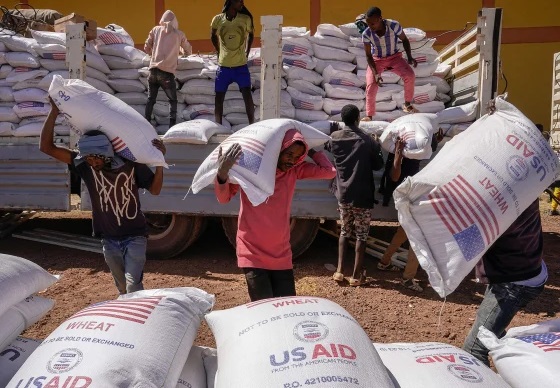
ANALYSIS | AGENCIES | The Trump administration’s decision to dismantle the United States Agency for International Development (USAID) is leading to a global geopolitical fallout.
As the US government halts billions of dollars in foreign assistance, concerns are mounting that global adversaries such as China and Russia could take advantage of the vacuum left behind.
USAID, established in 1961 under President John F. Kennedy, has been a pillar of US foreign policy, providing humanitarian aid, development funding, and strategic assistance across the world. The agency has historically played a crucial role in countering Soviet and later Chinese influence in developing nations.
The abrupt decision to shut down the agency has left diplomats, aid workers, and global leaders scrambling to understand the consequences.
USAID has traditionally allocated over $40 billion annually for programmes that include combating HIV/AIDS in Africa, stabilising conflict-prone regions, and supporting Ukraine in its defence against Russian aggression.
The freeze on funding and the immediate closure of its headquarters in Washington, DC, have already triggered confusion and disruption in global aid programmes.
“Trump’s actions are weakening American global leadership and influence,” New Jersey Senator Andy Kim told Bloomberg. “Our assistance abroad helps fight disease and stop starvation and famine, but it’s also a tool to stave off the expansionist reach of authoritarian leaders in China, Russia, and Iran.”
China’s strategic gains from USAID’s shutdown
With the US withdrawing from its longstanding role as the world’s largest donor, China is poised to expand its footprint in the developing world. Through its Belt and Road Initiative (BRI), Beijing has already invested trillions in infrastructure projects, securing access to critical minerals, energy resources, and strategic trade routes.
Unlike USAID, which provides grants and aid to support public welfare programmes, China primarily extends government-backed loans that often lead to long-term economic dependence.
Beijing’s growing influence in Africa, Latin America, and Southeast Asia is evident. The country has become the largest trading partner for several African nations and is financing large-scale infrastructure projects, including highways, railways, and energy plants.
While the US had been countering this influence through soft power initiatives, the elimination of USAID removes one of Washington’s strongest diplomatic tools.
“Although Beijing’s willingness to plug a multibillion-dollar hole in foreign aid is likely limited, it is already Africa’s top investor and trading partner, and the freezing of US aid means an opportunity to consolidate its economic and political influence,” according to Bloomberg Economics.
Russia’s geopolitical ambitions amid USAID withdrawal
Russia, like China, stands to gain from the dismantling of USAID. The agency has been instrumental in stabilising post-Soviet states, supporting democratic movements, and countering Russian influence in Eastern Europe and Central Asia.
Dmitry Medvedev, deputy chairman of Russia’s Security Council and one of President Vladimir Putin’s closest allies, wrote on social media: “Smart move by Elon Musk, trying to plug USAID’s deep throat. Let’s hope the deep state doesn’t swallow him whole…”
In recent years, Russia has transitioned from an aid recipient to an active global donor, expanding its foreign assistance efforts. However, the nonprofit organisation, The Borgen Project, notes that Moscow has also played a key role in undermining aid initiatives, using them as a tool to foster instability and incite hostility toward other nations.
Ukraine, one of the biggest recipients of US foreign aid, is particularly vulnerable. USAID has provided billions in assistance to Kyiv, funding everything from military aid to humanitarian relief.
With that support now uncertain, Moscow could seize the opportunity to expand its influence over former Soviet states, pushing them further into its sphere of control.
“The Trump administration has just put America last while handing a gift to our biggest adversaries, notably China,” wrote former USAID official Michael Schiffer in an opinion piece on an online forum Just Security. “America’s alliances will suffer. US partners will be at risk. And America’s enemies will rejoice.”
Public Health & Humanitarian consequences
The halt in US aid is also expected to have devastating effects on global health and humanitarian programmes. In sub-Saharan Africa, where USAID funds HIV/AIDS treatments and clean water initiatives, the uncertainty surrounding funding has already led to the suspension of critical projects.
In Bangladesh, over 1,000 aid workers employed in USAID-funded cholera and malnutrition programmes have been laid off. In Kenya, where the agency supports over 30,000 healthcare jobs, officials remain unclear on which services will continue.
“We are for sure going to experience cuts to clinical services,” said Tim Theuri, chief executive of the Kenya Health Care Federation. “For our leaders, this is a wake-up call.”
Meanwhile, global donors like the UK, France, and Germany have also reduced their foreign aid spending in recent years, making it unlikely that other Western allies will fully compensate for the US withdrawal.
While Secretary of State Marco Rubio has been appointed as the acting director of USAID and is reviewing potential restructuring, it remains unclear whether the agency will survive in any form.
The Trump administration insists the move aligns with its “America First” agenda and aims to curb wasteful spending. However, critics argue that shutting down USAID will cause long-term damage to US global standing, erode its strategic alliances, and create openings for authoritarian regimes to expand their influence.
US Senator Lindsey Graham put it during a Senate Budget Committee confirmation hearing for Russell Vought, Trump’s pick for budget chief: “If you don’t get involved in the world and you don’t have programmes in Africa where China’s trying to buy the whole continent, we’re making a mistake.”
****
Source: First Post with inputs from other agencies.
 The Independent Uganda: You get the Truth we Pay the Price
The Independent Uganda: You get the Truth we Pay the Price


